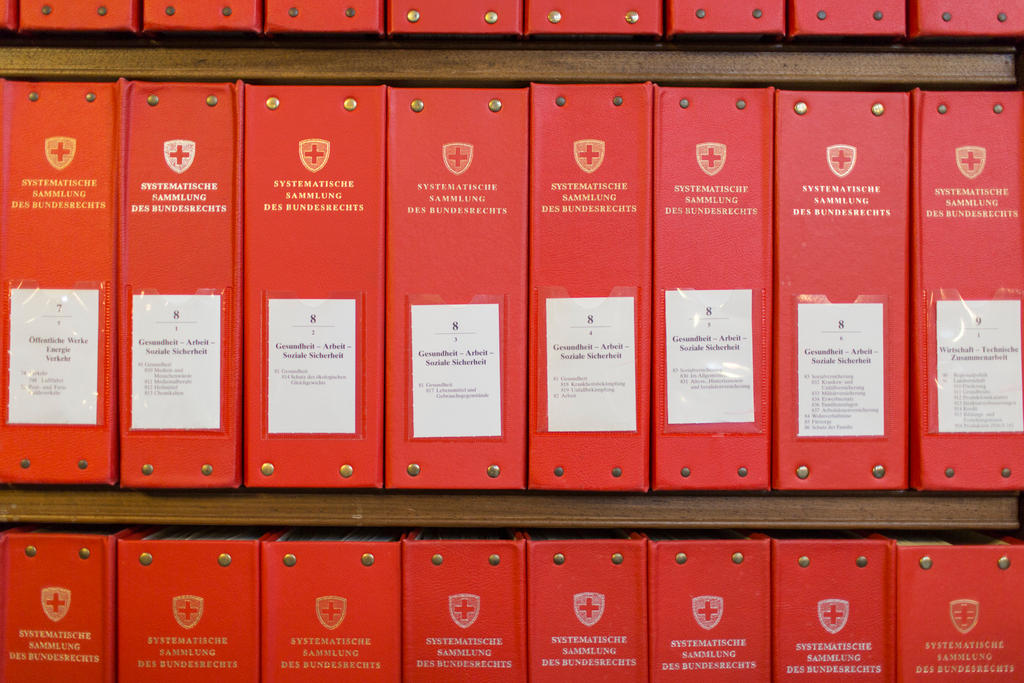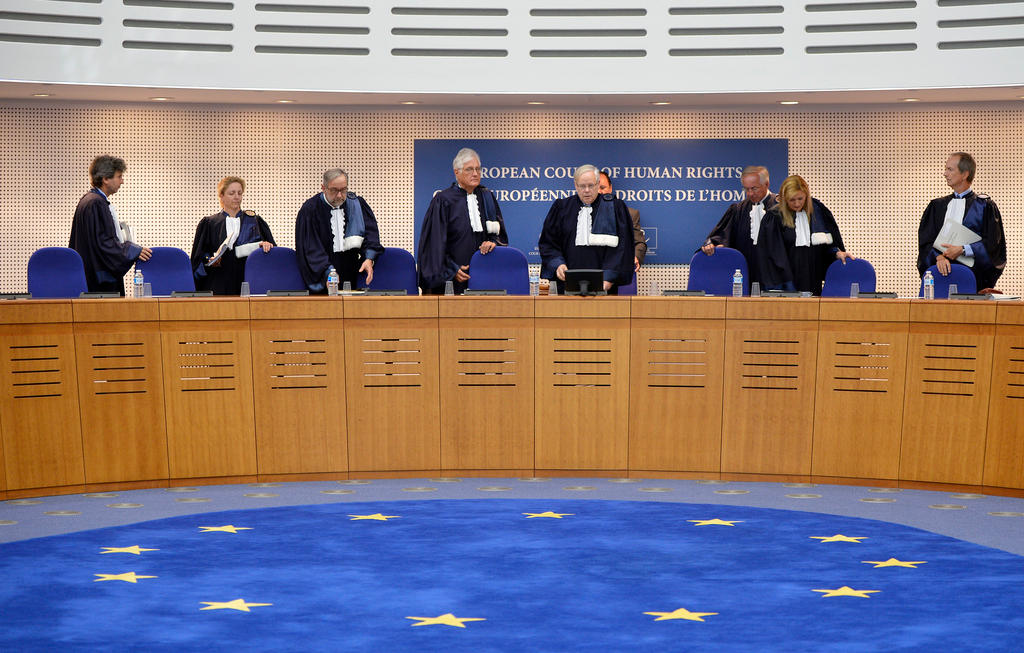‘Swiss law first’ initiative: what’s at stake?

The initiative ‘Swiss law, not foreign judges’ aims to give the constitution explicit precedence over international law, ensuring that the results of nationwide votes cannot be set aside because of international treaties. Opponents see this as a danger to basic human rights.
The issue will come to a nationwide vote on November 25.
The proposal, also known as ‘self-determination initiative’, was launched by the rightwing Swiss People’s Party. It proposes to enshrine a provision in the constitution that the supreme fount of law in Switzerland is that constitution – and not international law.
In other words, the initiative wants that Swiss-style direct democracy is not be subject to the provisions of international treaties.
The initiative is being described by its promoters as a response to what they see as the tendency of government, parliament and the Supreme Court to play fast and loose with vote results in the name of avoiding conflicts with international law.
What is the current situation?

More
Put national law before international law? Other countries do.
Current Swiss law does not lay down the precedence relations of international law and the Swiss constitution in a detailed or conclusive manner. The theory and practice of Swiss jurisprudence assume the precedence of international lawExternal link, although the constitution does not say this explicitly.
Seeing as the constitution is vague on this point, courts have considerable discretion. The Federal Court has repeatedly had to decide on the issue whether Swiss or international law take precedence. The constitution says that both are “binding” on the courts.
What is not binding, seemingly, is the Swiss constitution itself.
That means that parliament has a fairly easy time getting out of successful people’s initiatives it finds unpalatable. Parliament can decide to implement the initiative in some half-hearted way.
For a people’s initiative can only amend the constitution. Actual legislation is the job of the lawmakers, that is, parliament. What is binding on the courts is then whatever “watered-down” legislation the elected representatives have decided on, and not the constitutional amendment specified by the people’s initiative.
The promoters find this an intolerable situation.
What does the initiative propose?
The initiative proposes that the Swiss constitution should take precedence over international law. An exception would be fundamental principles of international law, such as those forbidding torture and slavery.
Where the constitution and international law conflict, Switzerland would have to renegotiate the relevant international treaty, or opt out of it altogether.

More
How to reconcile direct democracy and international law
Re-establish direct democracy?
Initiative advocates see direct democracy as being in danger and intend this initiative to defend it and re-establish it.
The People’s Party says that the “self-determination, unique in the world” enjoyed by the Swiss people in the form of direct democracy has in fact been a dead letter since 2012, when the Federal Court decided that it was going to put international law above the Swiss constitution.
As a result, government and parliament had simply failed to implement successful initiatives judged incompatible with the European Union agreement on free movement of people the European Convention on Human Rights.
Advocates are calling their initiative a ‘Yes to direct democracy’External link.
Decisions of the people, they say, must no longer be quietly shelved with a disapproving reference to international agreements, as happened with the initiatives on ‘Mass immigration’ or the ‘deportation of foreign criminals’.
The November 25 vote therefore involves the crucial issue whether Switzerland wants to preserve its direct democracy or not, according to supporters.
What would the initiative do?
The likely consequences of the initiativeExternal link passing are a matter of debate. Here are the issues:
– Withdrawal from agreements: according to opponents of the initiative, some 5,000 international treaties would have to be reviewed for conflicts and be renegotiated or cancelled altogether. In particular, 600 agreements crucial for the Swiss economy are at risk. The People’s Party denies this. No agreement of central importance for the country’s economy is endangered, they say, as these treaties do not conflict with the Swiss constitution.
– Basic human rights: opponents of the initiative warn that Switzerland’s adherence to the Human Rights Convention would have to be scrapped and Swiss would no longer be able to argue their cases at the European Court of Human Rights in Strasbourg. The People’s Party argues that quitting the Human Rights Convention is not the aim of the self-determination initiative, but it would accept that eventuality if it was unavoidable. For the People’s Party, this would not be a bad thing: the ‘foreign judges’ of Strasbourg are not needed, they say, because Switzerland guarantees human rights in its own constitution.

More
‘Foreign judges’ initiative: fact checking the parliamentary debates
– Legal clarity: proponents are of the viewExternal link that the initiative will bring clarity to legal decision-making, as it will state unambiguously that the federal constitution is the supreme fount of law. At the present it is unclear, they say, how a conflict between Swiss constitutional law and international law is to be dealt with. OpponentsExternal link claim the initiative is contradictory and, due to its lack of clarity, will make the situation a lot worse. It is unclear, they say, which international treaties are to be renegotiated, cancelled or broken, and who will decide all of this.
– A partner who can’t be trusted: according to its opponents, the initiative would have a negative impact on the image of Switzerland as a reliable international treaty partner, because it implies that the idea of breaking existing agreements is an acceptable one. The People’s Party plays this down, saying that Switzerland would only rarely have to break agreements; important international treaties are always subject to popular vote anyway, and thus would also be binding on future court decisions here.
– Problems with the EU: opponents of the initiative fearExternal link that the bilateral agreements with Brussels would have to be cancelled. The People’s Party is clearly not bothered by this eventuality: the party has already submitted a External linkfurther initiative which explicitly proposes to cancel the agreement with the EU on free movement of people.
– Economic downside: the business lobby group, economiesuisse, External linktakes the view that the ‘self-determination’ initiative would endanger Switzerland’s economy. The People’s Party insistsExternal link however that direct democracy is a guarantee of a stable and attractive place to do business.
Rejection recommended
The Swiss government is urging voters to say no: the initiative, it says, puts international treaties at risk, means lack of legal clarity, and thus endangers Switzerland’s economy.
Basic human rights protection would also be weakened, it says.
Parliament has also rejected the initiative: The House of Representatives voted it down with 129 to 68 votes, the Senate with 38 to 6 votes. Of the parties in parliament, only the People’s Party supports this initiative.
Not only government, parliament and political partiesExternal link have voted down the initiative, but also in civil society at large a broad-based movement of opposition is gathering steam.
Participating organisations reject the initiative for a variety of reasons: for the Swiss Business Federation (economiesuisse) External linkthe initiative represents an all-out attack on the interests of business.
University professorsExternal link warn of lack of legal clarity, NGOsExternal link see human rights endangered, and the Operation LiberoExternal link group points to negative impacts on international relations.
Representatives of the Swiss Abroad communityExternal link at the meeting of their council in August unanimously said no to the self-determination initiative. Expatriate Swiss are affected directly by international conventions and tend therefore to favour Switzerland’s linking with other nations.
Translated from German by Terence MacNamee

In compliance with the JTI standards
More: SWI swissinfo.ch certified by the Journalism Trust Initiative















You can find an overview of ongoing debates with our journalists here . Please join us!
If you want to start a conversation about a topic raised in this article or want to report factual errors, email us at english@swissinfo.ch.